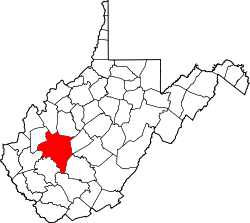Lincoln, West Virginia | |
|---|---|
| Coordinates: 38°18′59″N81°50′33″W / 38.31639°N 81.84250°W | |
| Country | United States |
| State | West Virginia |
| County | Kanawha |
| Elevation | 600 ft (180 m) |
| Time zone | UTC-5 (Eastern (EST)) |
| • Summer (DST) | UTC-4 (EDT) |
| GNIS ID | 2726001 [1] |
Lincoln was an unincorporated community in Kanawha County, West Virginia, United States.


